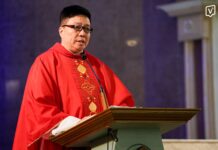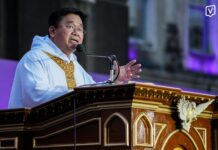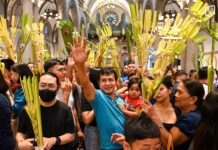
CHURCH officials and faith-based organizations play a vital role in encouraging people to support the government’s vaccination program, the World Health Organization (WHO) said.
WHO representative to the Philippines Dr. Rabindra Abeyasinghe said the extensive influence of religious leaders and groups would help build public trust in Covid-19 vaccines.
“We recognize the role of religious organizations as a catalyst for health and critical sources for support and information. Health and social measures must be informed by faith-based values to be effective and sustainable in stopping [the spread of] Covid-19 and giving help to those in need,” he said during the webinar titled “Collaboration in health emergencies: WHO, faith partners and national governments,” on Nov. 10.
Abeyasinghe said multi-level approaches and collaboration among the religious and private sectors and the national government had been instrumental in the country’s fight against Covid-19.
“The pandemic cannot be addressed by the health sector alone. We must work together to make a whole-of-society approach to this solution,” he said.
“We need to engage and empower people, especially those disproportionately vulnerable, to the threats and impacts of the pandemic. FBOs (faith-based organizations) are effective partners for community engagement, given the trust, respect, and sense of purpose they have among the community,” he added.
Abeyasinghe said several faith-based organizations have partnered with the WHO, including the Catholic Bishops’ Conference of the Philippines, Caritas Philippines, Lingap Pangkabataan, Philippines Children’s Ministries Network, Philippine Council of Evangelical Churches, National Council of Churches in the Philippines, Ranao Muslim Christian Movement for Dialogue and Peace, and World Vision Philippines.
Strengthen dialogue and partnership
Fr. Dan Cancino, Jr., executive secretary of the Catholic Bishops’ Conference of the Philippines (CBCP) Commission on Health Care, emphasized that dialogue is essential in showing solidarity with those suffering from the impact of the coronavirus pandemic.
“To emerge better from the crisis, the principle of subsidiarity must be implemented, respecting everyone’s autonomy and capacity to take initiative. It gives hope in a healthier and more just future,” Cancino said.
Fr. Antonio Labiao, Jr., executive secretary of Caritas Philippines, said partnership is key to establishing a “clear system” in the Covid-19 vaccine rollout.
“Partnership is always effective in any program like this. Everybody should be involved. We need to have a clear direction [with the pandemic response],” Labiao said.
Labiao added that local churches should do their part in answering questions regarding the vaccine and encouraging the faithful to get vaccinated.
The two priests were among the presenters of a case study on health emergencies in the Philippines during the WHO and Religions for Peace Global Conference, which will run until Dec. 3. Allyssa Mae C. Cruz













